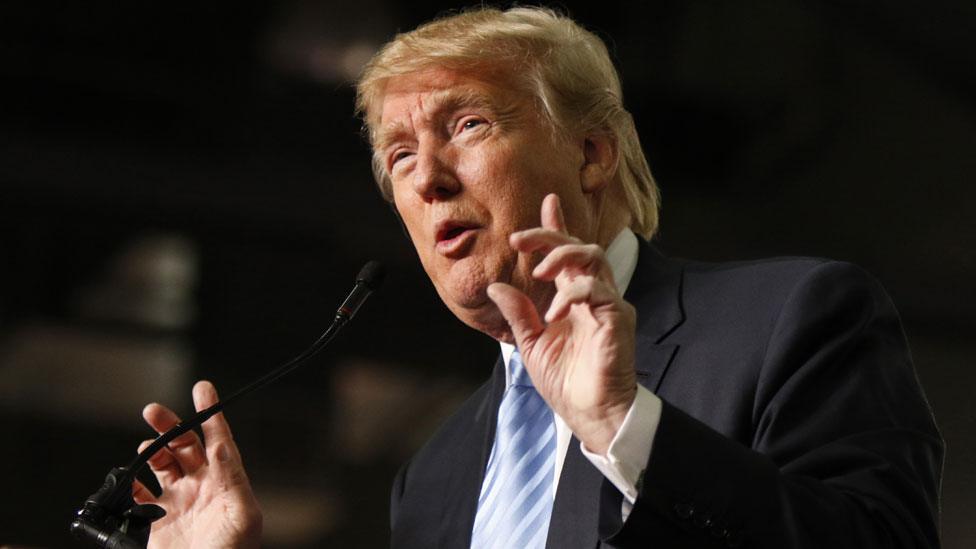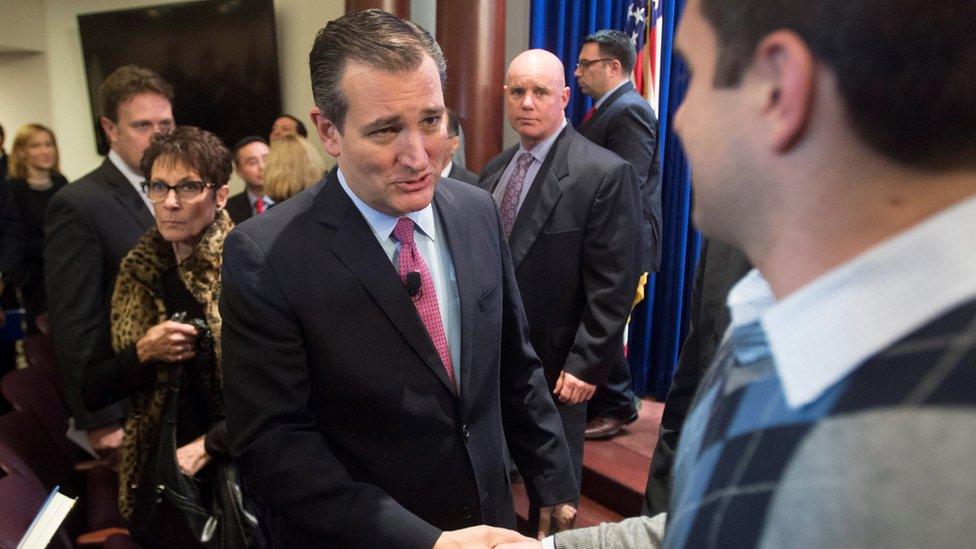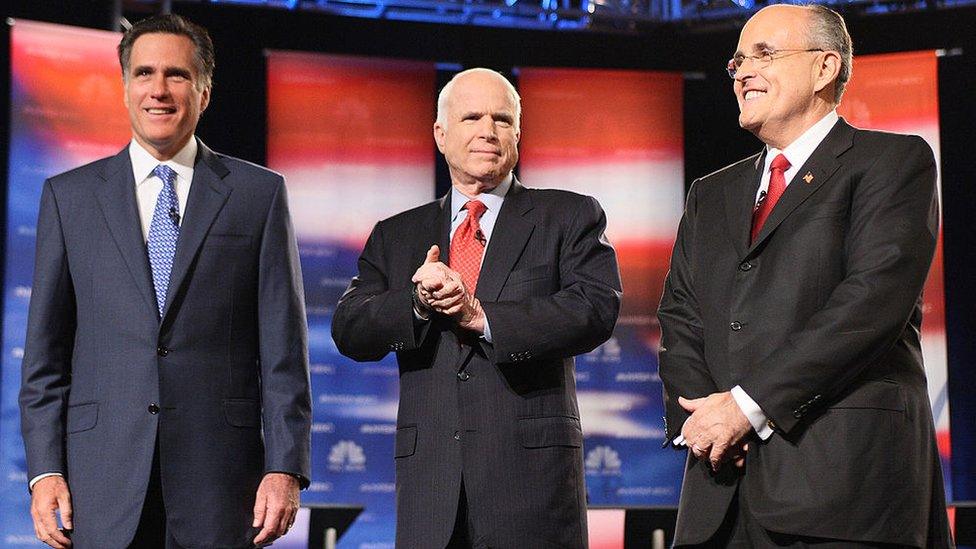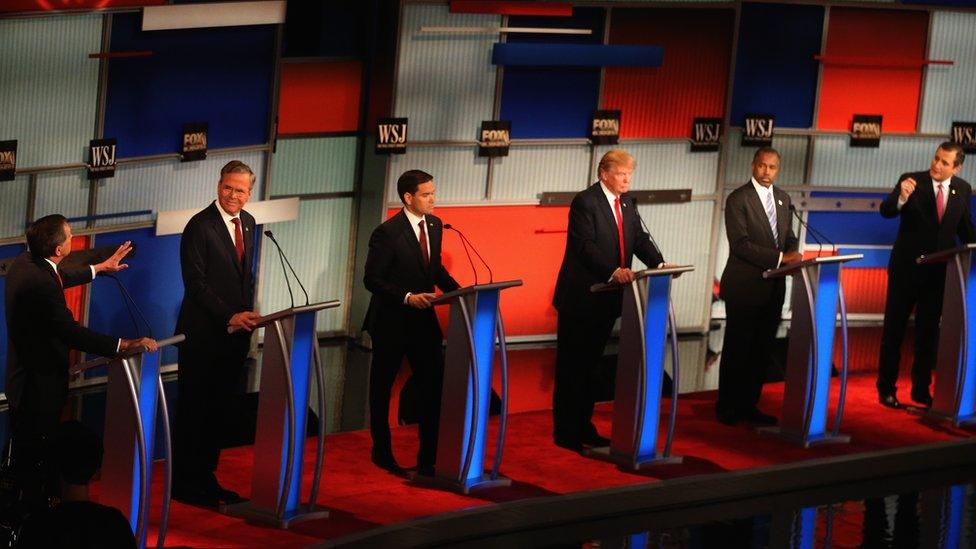Could Donald Trump really be US president?
- Published

Despite an outcry from fellow Republicans after increasingly controversial statements, billionaire Donald Trump continues to lead the field of candidates running for president.
But can he turn this support in the polls into votes and win the Republican nomination, or even the presidency itself?
Party voters will begin casting ballots on 1 February in Iowa, followed by New Hampshire and then a bevy of other states, to decide who will represent the party against the Democratic nominee.
We asked political experts about Mr Trump's chances.

Norman Ornstein, scholar, American Enterprise Institute
Yes to nomination, unlikely he will win the presidency
Despite the long-time pundit consensus that Donald Trump had no chance, he is likely in it for a long time and definitely has a chance to win the nomination.
To be sure, we need to be a bit cautious here. It is very early, and some survey results suggest that Trump's supporters have not voted before in primaries or caucuses.
But his support is not simply capped at 25%, and even if it were, he can still win several early contests and build more momentum. He has not had to spend any real money, but has allocated significant resources to building some structure in the early states.

Don't count out Ted Cruz, says Norm Ornstein
The more we have the possibility of another terrorist attack in the US or even in Europe akin to Paris or San Bernardino, the more his strongarm, strongman rhetoric resonates with angry and disaffected conservative voters.
We can't downplay and shouldn't underestimate the power of the anti-establishment anger at both Republican leaders and Mr Obama, fuelled by talk radio and bloggers who have enormous financial incentives to do so. It is very unlikely but not impossible he could also win a general election.
But it is also important to keep an eye on Ted Cruz, who also has a strong possible road to a Republican nomination if Trump falters at all. He has assiduously courted evangelicals and Carson voters, and is cleverly positioning himself to get many of the Trump supporters.

Robert Schlesinger, managing editor for opinion, US News & World Report
No to nomination / presidency
There are several good reasons to believe that Donald Trump will not be the Republican party's nominee. We can start with history.
Never, ever has a major US political party nominated someone so utterly lacking in experience as Mr Trump.
Five times men have achieved the presidency as their first elective office, but three of them were military heroes and the other two had served as presidential cabinet secretaries.
More recent experience demonstrates the deep fallibility of opinion polling. On this date eight years ago the Republican polling frontrunner, as he had been all year, was former New York City Rudy Giuliani.

Rudy Giuliani failed to win the nomination in 2008 - despite polling as frontrunner for a long time
The man who actually won the nomination, Arizona Senator John McCain, was in fourth place. Four years ago former House Speaker Newt Gingrich enjoyed a double-digit lead over Mitt Romney.
The former Massachusetts governor would win the nomination but not before seeing himself eclipsed in the polls by Mr Gingrich a second time.
Mr Trump has clearly tapped a noxious nerve among Republican voters insecure about the economy, the country's changing demography and terrorism. But he also benefits from the self-fulfilling cycle of unending press coverage.
One way or another - whether it's because a rival finally starts a sustained assault on Trump involving paid ads, or because his straight-line journey to the political fringe finally repels enough supporters - Trump will fade well before the convention.

Froma Harrop, nationally syndicated newspaper columnist
Yes to nomination, no to presidency
Donald Trump's run for president seemed a lark at first. Some speculated that his early outrageous statements - the wholesale smearing of Latinos, for example - were attempts to sabotage a campaign that he never intended to become serious.
But here we are. He's been denounced across the globe and he's doing just fine among his largely blue-collar fan base.
Can Trump win the Republican nomination for president? Any doubt that he's serious is gone. So is the assumption Republican elders could easily sink his candidacy and secure a more respectable choice.
Yes, Trump could win the Republican nomination.
Could he win the general election and become president? No way. Polls have long shown Hillary Clinton, the likely Democratic nominee, edging out all the Republican possibilities, Trump included.

Delegates will be awarded proportionally - meaning the primary contests could be a long slog
His latest eruption was so bizarre that many Republicans are now openly contemplating a vote for Mrs Clinton. A new survey has a third of Republicans saying that Mr Trump scares or concerns them.
And let's be mindful that though Trump leads other Republican candidates, he commands only 35% percent of the party's total primary electorate.
The next president will not be Trump. That he got this far is worry enough.

Kyle Kondik, an analyst of political campaigns at the University of Virginia
Unlikely to win nomination, no to presidency
Some have pointed to Donald Trump's endurance at the top of the Republican primary polls as an indication that his various absurd and offensive comments have not done him damage. But I think they have done him real harm.
Trump's racist proposals and rhetoric have solidified the GOP leadership against him and made it easier for other Republicans to argue that the man would be a disaster as the general election nominee against Hillary Clinton, an opponent who Republicans do not want to be president.
The primary process is a long slog that starts in February and ends with the convention in July, and unlike in previous contests where losing candidates have dropped out earlier than they needed to in deference to the clear winner, the other competitors will have little reason to cede the nomination to Mr Trump. If he thought standing on a debate stage for three hours was hard, wait until he has to endure that slog.
Trump is very unpopular nationally - one recent poll pegged his favourability/unfavourability split at 30% favourable/60% unfavourable - and it's hard to see how he would improve those numbers if nominated.
One of the persistent questions of this election is whether Mrs Clinton can motivate lower-turnout, non-white voters to show up to the polls. The presence of Mr Trump at the top of the ticket would be, for Clinton and the Democrats, the best motivator of all.

Rebecca Deen, professor of political science, University of Texas at Arlington
Possible but unlikely he will win nomination / presidency
Although Mr Trump has captured the overwhelming majority of news coverage and has tapped into a real demand in the electorate for the anti-politician, a great deal stands between him and the nomination. In order to win, he needs 1,236 delegates out of the 2,470. He gains delegates by garnering a high percentage of votes in each state's caucus or primary.
One wrinkle is that the Republican National Committee mandated this year all states with contests prior to 15 March have to allocate their delegates proportionally, based on the percentage each candidates receives. After that, it's winner takes all.
There are a number of primaries or caucuses before that date. The two early states, Iowa and New Hampshire, matter because the outcome there will generate buzz and momentum. The most recent polls of likely voters have Trump up in New Hampshire by 18 points, but even with Senator Ted Cruz in Iowa, when one accounts for the margin of error. After these two are South Carolina, Nevada and so-called Super Tuesday - 12 states on the same day - on 1 March.
Because all these contests allocate proportionally, it gives Mr Cruz, Marco Rubio, Ben Carson and possibly Chris Christie every incentive to hang on. Between this factor and the most recent outrageous statements by Mr Trump, a lot can change on the way to the nomination.